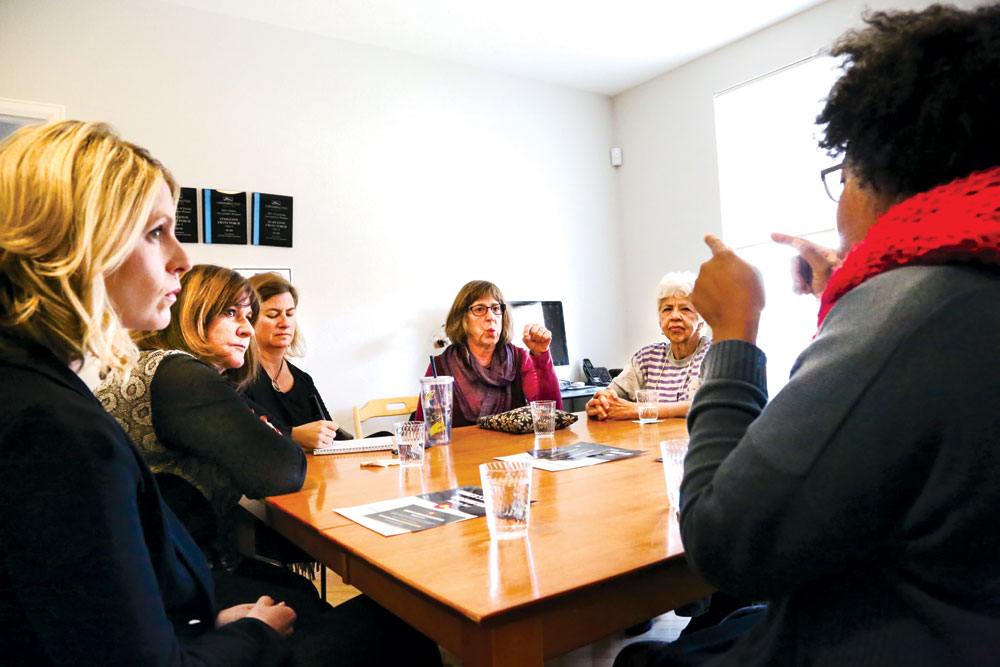
A roundtable of women discussed the upcoming Women’s March on Washington, D.C.: their reasons for supporting it/marching in it, their perspectives on current issues, and their plans to continue political activism through the next election cycle. For these women, the march is just the beginning.
An estimated 200,000 women from all 50 states and more than 12 countries will march on Washington, D.C., on Jan. 21, 2017. The Women’s March is expected to be the largest demonstration occurring in D.C. in response to President-elect Trump’s inauguration. Drawn together in the wake of a surprise election win by Trump, the participants have united under a comprehensive mission statement and five guiding principles.
The core of the mission statement states: “The Women’s March on Washington will send a bold message to our new administration on their first day in office, and to the world that women’s rights are human rights. We stand together, recognizing that defending the most marginalized among us is defending all of us.” The guiding principles for the newly fledged movement center around nonviolent resistance and community, in the spirit of historical movements such as those of Martin Luther King Jr.
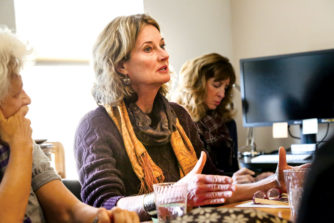
Ruth Clevenger
The Front Porch convened a panel of marchers and march supporters from Denver. The participants have been thinking deeply about their roles in the community and how they can act to protect rights and promote equal justice. In a two-hour conversation, this diverse group of seven women shared the reasons they are marching or supporting the movement, and their plans to continue to take action afterwards.
Called to Action
Jen Woolf, a former school administrator who has a background working with diverse families, said, “the rhetoric around families (during the election) was so upsetting to me.” Two days after the election, the Stapleton resident was reading an article by Gloria Steinem that echoed Martin Luther King Jr.’s words, “If you’re being called to do something, you have to do it.” Woolf recognized that she was being called and booked her tickets.
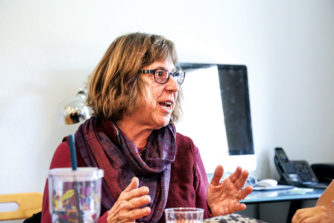
Wendy Rochman
“It’s easy as a middle-class to upper-middle-class white woman to say that things are getting better, but I think that a lot of things have come to light,” said Stapleton resident Tiffany Spector. Whether it is swastikas painted on a local elementary school or police brutality against African-Americans, “all this is not something we can brush aside unless we show up and we do something.”
Several of the women present expressed a fear that rights that have long been taken for granted are under threat. Wendy Rochman grew up in Memphis, Tenn., in the 1950s, “where Jews were not allowed in the public pool, and I was the only Jewish girl in my school, and that was my reality.” Wendy Rouder recalled accompanying a friend of hers to a back-alley abortion and being asked to give her name after she assisted the doctor with the procedure. “A year later, the D.A. called me, because he (the doctor) had been arrested.”
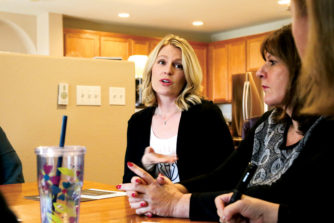
Tiffany Spector
Park Hill resident DeRonn Turner won’t be going to the D.C. march but feels that her biggest role is “remembering to create a voice for black women,” who are often invisible. To Turner, a mother of four, “it is critically important that all of these groups remember to listen to what other people say … No matter what we look like, we are in this together,” a sentiment shared by many at the table. “We and they are not the reason to march—it is us,” echoed Woolf.
The March
“This election has just mobilized people in a way I haven’t seen since the ’70s,” said Wendy DiLivio, one of three statewide organizers for the national march. A former child psychologist and novice organizer, DiLivio is leaning in with help from over 500 volunteers. Nearly 2,000 Colorado women have committed, she said, and organizers anticipate the numbers from our state could reach five or ten thousand.
Recognizing that many women who want to participate cannot afford to, the organizers are working on scholarships and selling T-shirts. So far, fundraising will allow five Colorado women to go to D.C. But for those without the time or means, there are “sister marches” occurring across the country, including a rally that will take place in downtown Denver on the same day.
“The march is a show of strength—and just the beginning,” said DiLivio. Ruth Clevenger, a West Washington Park officer of the Democratic Party for District 2, added, “There is this huge upsurge of energy, commitment and concern and a recognition that we have to form strong alliances with all of the groups, whether it’s for racial justice, LBGTQ, women’s issues.” Clevenger believes that acting locally is key. Rochman agreed, invoking a metaphor of a national tree, “where each branch is a state and each twig a community—you’re not going to get the energy from the leaf in those faraway communities into the roots unless you go out there” and listen and act locally, she said.
The Conversation
The animated and at times emotional conversation covered a wide range of topics and ideas, politically and personally.
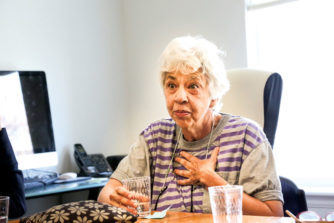
Wendy Rouder
For example, Clevenger described the anger she felt after the election, “I can feel it physically. I have no room in my life anymore for people and things that add no value.” In contrast, Turner relayed her belief that anger is a destructive force, that even in the face of extreme bigotry, “I have to go and walk with that person, in spite of how they feel about me. It’s not about taking sides, it’s about learning to come around and work together,” she said. Turner thinks back on the hardships of her grandfather, the son of a former slave, and of Nelson Mandela, and recognizes that with love, compassion, and truthful acknowledgment of the problems, there can be reconciliation.
“If our government works the way it is supposed to work, if it is not gerrymandered or driven by dark money,” said Clevenger, “then every citizen is guaranteed the same rights, freedoms, privileges, and responsibilities.” Around the table there was a consensus that a shared belief in “Equal Justice Under the Law” and working toward shared goals can offer a way forward. Linking arms and walking through the door together will prove a powerful approach over the next four years.
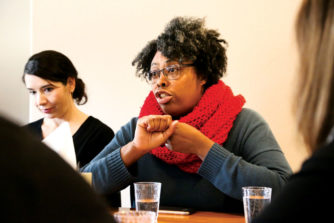
DeRonn Turner
The Next Four Years
When asked about their plans after the march, through the next election cycles, the women at the table are committed to channeling their energy and vision into concrete actions. DiLivio says march organizers are reaching out to other organizations to work on common goals. A list of these organizations can be found online.
In our neighborhood, Spector suggests working with organizations such as Planned Parenthood and the Refugee Welcome Center at Isabella Bird Community School. Turner feels that strengthening connections between Stapleton and Park Hill residents—across racial lines—is a place to start. “Outreach looks like something just as small as saying hello to somebody at the grocery store,” she says, or getting involved with groups like Northeast Denver for Racial Justice and Showing up for Racial Justice (SURJ).
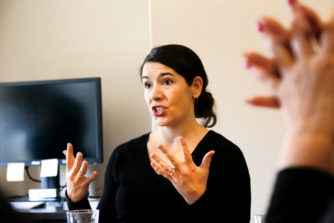
Jen Woolf
“While there are these big national issues, a lesson we should learn from the opposition is that you start with local and state offices,” says Clevenger. “Organizations are identifying people with the interest and the potential to take leadership roles, to run for office, to help organize these movements. But we’ve got to have a really tangible action plan.” She hopes to recruit and mentor young, diverse talent to run for state and local offices.
“Education seems to me the absolute core,” says Rochman, a former educator, and many agreed with her. Turner is committed to continuing her work in local schools, advocating for cultural sensitivity and equitable gifted education programs. Woolf, with her background in education, hopes to keep pushing at the local school-board level to make change, as well as getting involved with national anti-gun organizations.
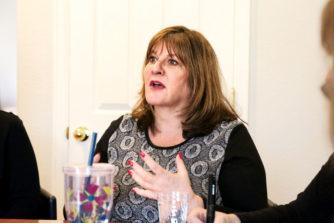
Wendy DiLivio
Spector, who underwent a long cycle of treatment for breast cancer in 2015, uses her experience as an analogy: “Going through cancer, people identify it as a time when you’re given a gift. That’s not how I saw it. But something comes out of going through an experience that is difficult that you can learn from,” she said. Likewise, the election and all the ugly rhetoric and actions that arose “woke up a lot of people that weren’t paying attention to the fact that this was going on the whole time. It wakes you up to want to take action. And I feel like I’ve been woken up … The time is right for me to take my life in a different direction and do things that I can be proud of, to make me feel like there’s a reason for me to be here.”
To learn more about the Women’s March on Washington – Colorado, go to https://www.womensmarch.com/colorado or search on Facebook.




Thank you “front porch” fro sharing your thoughts and commitment to standing together for the good of all and to act in a non violent way after the example of Gandi, King, and Mandela.
I haven’t been this energized since 1972 thank you for all you are doing to organize this movement